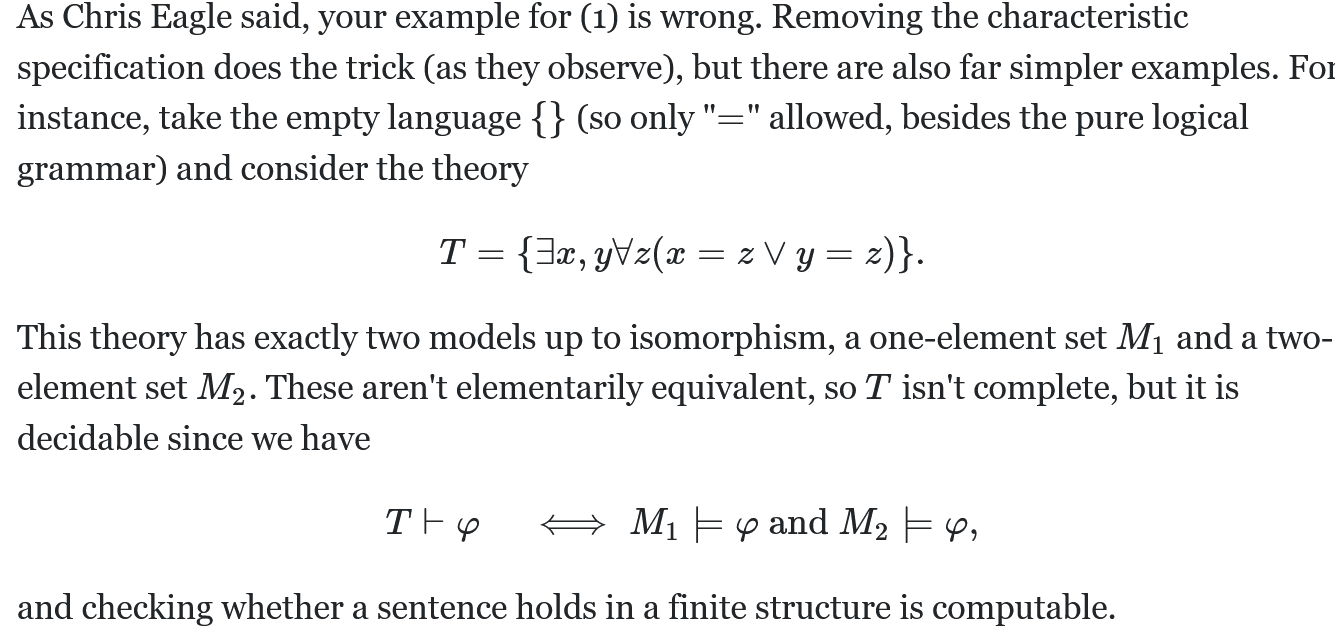Does decidability of a theory imply completeness of the theory?
8Algon
4Noosphere89
2Algon
6Rafael Harth
2Noosphere89
2Algon
2Noosphere89
9lbThingrb
2Noosphere89
5lbThingrb
2Noosphere89
2Algon
New Answer
New Comment
1 Answers sorted by
82
No. This answer to a related stack-overflow question explains why:

That is to say a first order logic without any predicate or function symbols is decidable. But you can have incomplete theories in such a signature.
Thank you for answering the question quickly, it was nice to know that being decidable wasn't implying completeness like completeness implied decidability.
2
Completeness doesn't imply decidability though? Peano arithmetic is complete and undecidable. Maybe you meant completeness + semidecidability - > decidability?
6
Peano arithmetic is not complete. I think the claim from my post is correct except that it misses having a computable set of axioms as a second requirement (which in the post more or less follows from context, though I should still probably add it explicitly) actually nvm I did say this in the post. (See e.g. https://math.stackexchange.com/questions/1280043/every-complete-axiomatizable-theory-is-decidable)
2
Your post is below, so anyone else can follow this conversation if necessary.
https://www.lesswrong.com/posts/Tb4mJWh3FYGRyid6C/understanding-goedel-s-incompleteness-theorem
2
Sure, that's true. I should've said the theory of the standard model of Peano arithmetic. That's complete, undecidable and can't have a recursive axiom system.
2
I'm going to ask a new question, different from the old question I asked: Given a halt oracle added to the Turing Machine, that is a magical oracle tape that can solve all problems Turing-reducible to the halting problem, can we nail down the standard interpretation/model of Peano Arithmetic?
9
The true first-order theory of the standard model of arithmetic has Turing degree 0ω. That is to say, with an oracle for true arithmetic, you could decide the halting problem, but also the halting problem for oracle Turing machines with a halting-problem-for-regular-Turing-machines oracle, and the halting problem for oracle Turing machines with a halting oracle for those oracle Turing machines, and so on for any finite number of iterations. Conversely, if you had an oracle that solves the halting problem for any of these finitely-iterated-halting-problem-oracle Turing machines, you could decide true arithmetic.
2
So the answer is no, even a magical halt oracle cannot compute the true first order theory of the standard model of arithmetic, but there are machines in which you can compute the true first order theory of the standard model of arithmetic.
5
Correct. Each iteration of the halting problem for oracle Turing machines (called the "Turing jump") takes you to a new level of relative undecidability, so in particular true arithmetic is strictly harder than the halting problem.
2
Sort of, though I was thinking of this quote from Rafael Harth's post below:
I was trying to think of an answer to how this could work, or alternatively how this couldn't work.
2
Based off that passage, I don't see Rafael Harth's argument works either.
Curated and popular this week